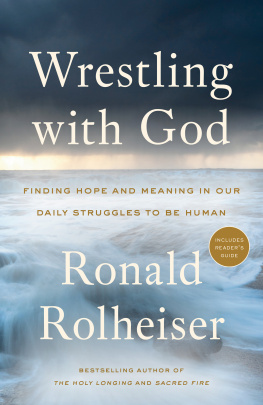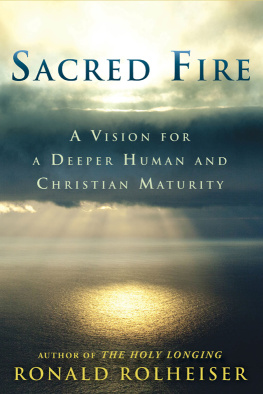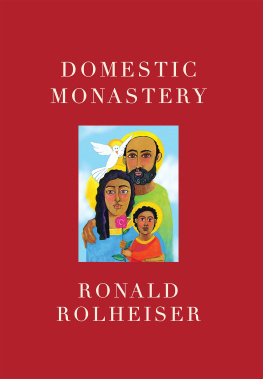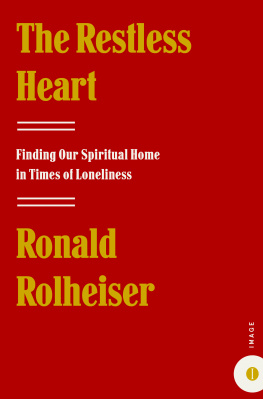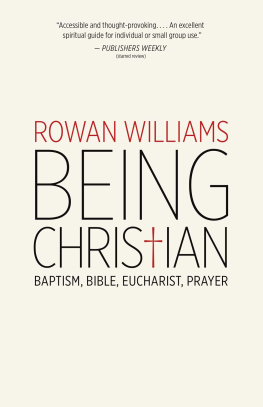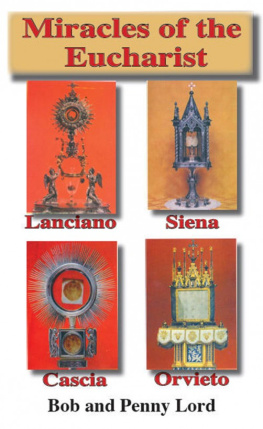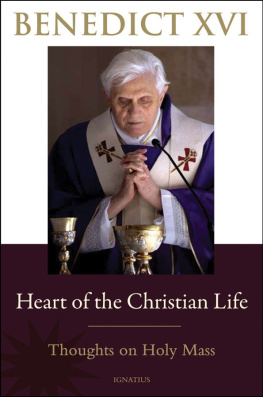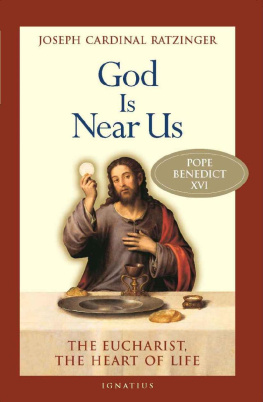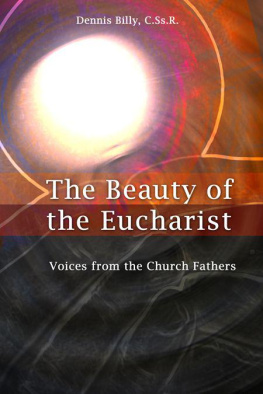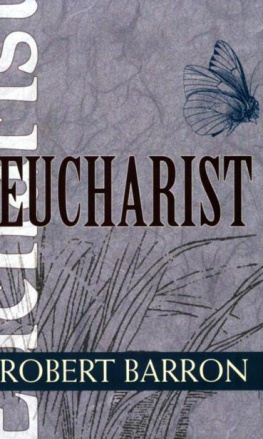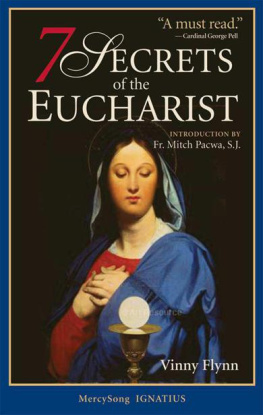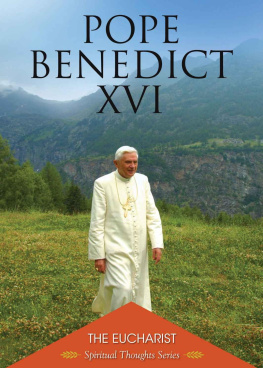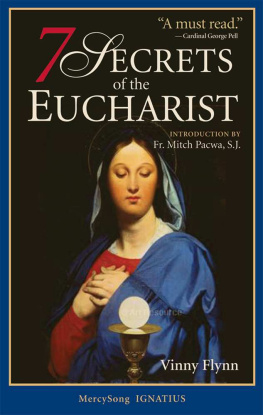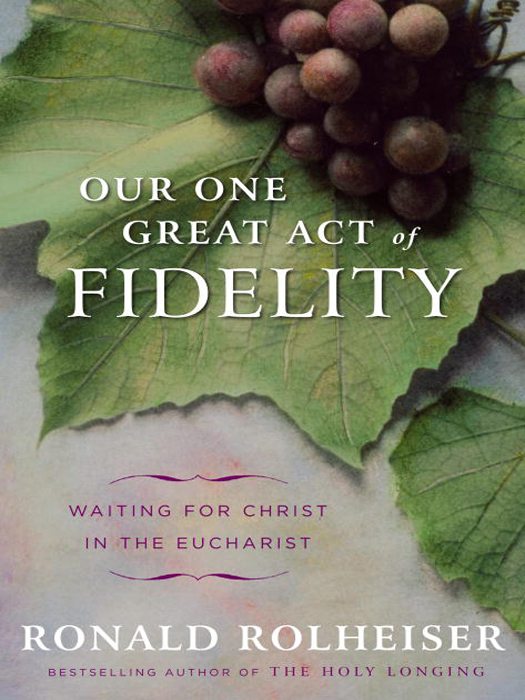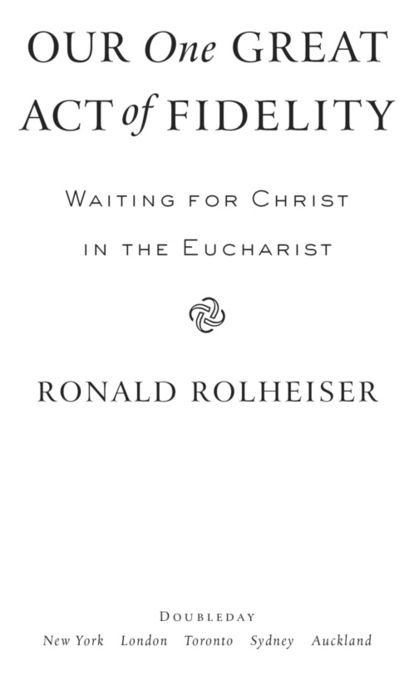A LSO BY R ONALD R OLHEISER
Secularity and the Gospel: Being Missionaries to Our Children
Forgotten Among the Lilies: Learning to Love Beyond Our Fears
The Restless Heart: Finding Our Spiritual Home in Times of Loneliness
The Holy Longing: Guidelines for a Christian Spirituality
Against an Infinite Horizon: The Finger of God in Our Everyday Lives
The Shattered Lantern: Rediscovering a Felt Presence of God

DOUBLEDAY
Copyright 2011 by Ronald Rolheiser
All rights reserved.
Published in the United States by Doubleday Religion, an imprint of the Crown Publishing Group, a division of Random House, Inc., New York.
www.crownpublishing.com
DOUBLEDAY and the DD colophon are registered trademarks of Random House, Inc.
Library of Congress Cataloging-in-Publication Data
Rolheiser, Ronald.
Our one great act of fidelity : waiting for Christ in the Eucharist / Ronald Rolheiser.
p. cm.
1. Lords SupperCatholic Church. I. Title.
BX2215.3.R65 2011
234.163dc22
2011001543
eISBN: 978-0-307-88705-4
Jacket design by Misa Erder
Jacket photograph by Getty Images
v3.1
For the parish community of St. Donatus
in the hill country of Cactus Lake, Saskatchewan,
for raising me in the faith and the Eucharist.
Heartfelt thanks. I carry your birthmark.
CONTENTS
PREFACE
This is a very personal book. While it draws upon the insights of various scripture scholars, theologians, and church teachings, in the end, it is mostly a personal statement of how I understand the Eucharist and why, unless some major circumstance prevents me from doing so, I celebrate Eucharist every day. The Eucharist, more so than anything else, is what anchors my life, my prayer, and my discipleship.
And I have a long, rich, mixed tradition in my practice and understanding of the Eucharist:
Mostly, I have Roman Catholic genes, particularly in relationship to the Eucharist. As a child, I was raised in family and community that was deeply Roman Catholic and within which the Eucharist held the central place. Our parish community was too small to have its own priest, and because of this we didnt have the opportunity to go to Eucharist every day. A priest from a neighboring parish would come for mass on Sundays and major feast days and, later on when our country roads became a bit more friendly, on Thursday evenings as well. Our family went to Eucharist whenever we could, and even though we couldnt go to Eucharist every day, I was raised to believe that daily Eucharist was the ideal. My parents dream was ultimately to retire to a place where, in their retirement years, they would have the opportunity to go to Eucharist every day. Sadly, they both died before reaching the age of retirement, but I inherited from them and from our parish community the belief that the Eucharist is the centerpiece of Christian practice and that no season of life (and, ideally, no single day) should be lived without it.
At seventeen, I entered the Missionary Oblates of Mary Immaculate and what I had learned from my family was reinforced there. Through eight years of seminary training, daily mass was simply a given, the air we breathed. When I was ordained to the priesthood, I understood, as part of the covenant that a priest makes with the community, that my role as priest contained the promise to habitually (ideally, daily) celebrate the Eucharist as a prayer for the world. Ive been ministering as a priest for nearly thirty-seven years and I have kept that promise. Unless circumstances dont allow for it, I celebrate Eucharist every day.
But home is where we start from. Since ordination, through my years of ministry and particularly through my contact with other churches, my understanding of Eucharist has widened. Ive never lost the understanding of the Eucharist that my Roman Catholic background gave me; it is still my deepest faith treasure, but, as more and more Protestants and Evangelicals became friends and faith companions, I was introduced to different understandings and practices of the Eucharist and other ways within which to think of the Word and the Eucharist as interrelating. Some of my deepest faith companions now are not Roman Catholics, and they understand certain aspects of the Eucharist differently than I do. One of my godchildren, a niece of whom I am immensely proud, is a Lutheran. I share deeply my faith journey with various Protestant clergy, and some of them share their struggles and journeys with me. I preach to Protestant and Evangelical groups in the same way as I preach to Roman Catholics, and I am empathic toward their faith struggles since those are also my struggles. As I age, my sympathies and my loyalties become more stretched. Ill always be a Roman Catholic, but my faith journey and my heaven now include Protestants, Evangelicals, Jews, Muslims, Buddhists, Hindus, Taoists, and sincere searchers and struggling persons of every sort. The Eucharist is Gods banquet table, and in the end, it will manifest the universal salvific will of God who plays no favorites but embraces everyone without discrimination. To deny this is to massively reduce both the scope of Christs embrace and the meaning of Christian baptism.
This book, because it is deeply personal, will reflect my own particular background: my Roman Catholic upbringing and beliefs, the central place that the Eucharist occupies within that tradition, and my genetic propensity for daily Eucharist. But I hope it will reflect an understanding and a respect for other traditions around the Eucharist and other ways of anchoring faith and searching for intimacy with God and each other. For the times when this understanding and respect is not evident, I apologize in advance. Everyone has biases and blind spots. I freely admit to mine.
Perhaps the simplest rationale for this book is this: The Eucharist is my major faith-anchor. Whenever I can, I go to Eucharist each day. This book is simply an attempt to explain the reason whyto others no less than to myself.
Ronald Rolheiser
Sarita, Texas
PART ONE
The EUCHARIST and the
INCARNATION
The INCARNATION and
the BODY of CHRIST
A story that is familiar to many of us tells of a young girl who woke up one night frightened and disoriented, convinced that there were spooks and monsters around her in the darkness of her room. She ran to her parents bedroom for safety. Her mother brought her back to her own room, put on a light to show her that there was nothing there, and gently tried to reassure her that she was safe. Then, just before leaving, the mother said to her, You dont need to be afraid. You arent alone. God is here in the room with you. The child replied, I know that God is here with me, but I need someone here who has some skin!
We are all like that little girl. As human beings we are sensual creatures in the true meaning of that term. We are creatures of the senses: touch, sight, hearing, smell, and taste. Everything that enters us goes through one of those five senses and everything that comes out of us, all communication and expression, comes out through one of those same senses. We are not angels, pure spirits without bodies. We are incarnate spirits, souls that have a body, and so we need things that we can touch, see, hear, taste, and smell.


